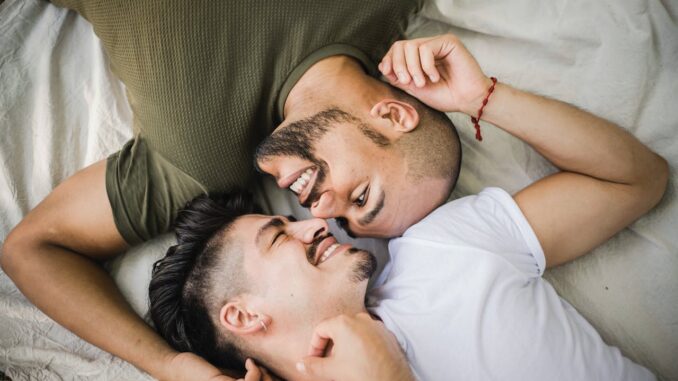
LGBTQ Relationship Therapy Explored
In the ever-evolving landscape of relationships, it’s crucial to acknowledge the unique challenges faced by LGBTQ+ couples. As a couples therapist specializing in queer relationship therapy, I have had the privilege of working with diverse individuals seeking guidance and support.
In this blog post, we will delve into 25 reasons why LGBTQ+ couples often seek relationship counseling and explore the crucial role that queer relationship therapy plays in fostering healthy and thriving partnerships.
Keep in mind the terms “relationship therapy” and “couples therapy” are used interchangeably because within the LGBTQ spectrum, some relationships can be multi-partner in nature, sometimes referred to as polyamorous.
I mention this because the term “relationship therapy” can sometimes bring up heteronormative ideas related to traditional (dual-only) situations. The truth is queer relationships can be very different than their heterosexual counterparts.

Common Relationship Issues for LGBTQ People
1. Navigating Identity Dynamics: The intricacies of navigating diverse gender identities and sexual orientations within a relationship can be complex, and couples may seek guidance in understanding and embracing each other’s identities.
2. Coming Out Challenges: The coming-out process is a significant milestone for many LGBTQ+ individuals. Relationship counseling can provide a safe space to explore the impact of coming out on the dynamics of the relationship.
3. Family Acceptance: Family dynamics and acceptance play a pivotal role in LGBTQ+ relationships. Couples may seek counseling to navigate challenges related to unsupportive or non-accepting family members.
4. Communication Barriers: Like any couple, LGBTQ+ partners may face communication challenges. Relationship counseling offers tools and strategies to enhance communication and foster deeper connections.
5. Intimacy and Sexuality: LGBTQ+ couples may encounter unique challenges related to intimacy and sexuality. Relationship therapists can provide a supportive environment to discuss and address these issues.
6. Legal and Social Challenges: Discrimination and legal challenges can impact LGBTQ+ couples. Seeking counseling can provide a space to navigate the external stressors affecting the relationship.
7. Blending Cultures: In multicultural LGBTQ+ relationships, couples may face challenges related to blending different cultural backgrounds. Relationship counseling can help navigate these complexities.
8. Internalized Homophobia or Transphobia: Internalized homophobia or transphobia can affect self-esteem and the dynamics of a relationship. Therapy can provide tools to address and overcome these challenges.
9. Infidelity: Like any couple, LGBTQ+ partners may face issues related to infidelity. Relationship counseling can help rebuild trust and explore the underlying issues leading to such actions.
10 Parenting Challenges: LGBTQ+ couples may face unique challenges related to parenting, whether through adoption, surrogacy, or blended families. Counseling can provide support in navigating these complexities.
11. Mental Health Concerns: LGBTQ+ individuals may be more susceptible to mental health challenges. Relationship counseling can help partners support each other through periods of anxiety, depression, or other mental health issues.
12. Intersectionality: Recognizing and addressing the intersectionality of identities within LGBTQ+ relationships is crucial. Therapy provides a space to explore how factors like race, ethnicity, and socioeconomic status intersect with the relationship.
13. Dealing with Microaggressions: Couples may seek counseling to navigate the impact of microaggressions and discrimination from society, friends, or family.
14. Grief and Loss: Coping with the loss of a loved one, whether due to illness or discrimination, can be particularly challenging for LGBTQ+ couples. Relationship counseling can provide a space to grieve together and support one another.
15. Open Relationships: Some LGBTQ+ couples may explore open relationships. Relationship counseling offers a space to establish clear boundaries and foster open communication about these arrangements.
16. Religious Differences: Couples with diverse religious backgrounds may face challenges related to acceptance and understanding. Queer relationship therapy can help navigate these differences and find common ground.
17. Financial Strain: Economic challenges can strain any relationship. LGBTQ+ couples may seek counseling to manage financial stress and make informed decisions as a team.
18. Transitioning: When a partner undergoes gender transition, it can impact the dynamics of the relationship. Relationship counseling provides a supportive environment to navigate these changes together.
19. Lack of LGBTQ+ Community Support: In some regions, LGBTQ+ communities may be small or less visible. Couples may seek counseling to cope with the lack of community support and find alternative sources of connection.
20. Equality in the Relationship: Achieving equality in a partnership is an ongoing process. Relationship counseling can help address power imbalances and foster a sense of equity.
21. Social Media and Technology Impact: The influence of social media and technology on relationships is universal, but LGBTQ+ couples may face additional challenges related to online discrimination. Counseling can help establish healthy boundaries.
22. Managing Expectations: Cultural and societal expectations may impact LGBTQ+ relationships. Couples counseling can help partners manage these expectations and define their relationship on their own terms.
23. Addressing Substance Abuse: LGBTQ+ individuals may be more susceptible to substance abuse due to societal pressures or the need for coping mechanisms. Relationship counseling can provide support for partners facing these challenges.
24. Building Resilience: LGBTQ+ couples may seek counseling to build resilience in the face of societal adversity. Therapy can empower couples to navigate challenges together and emerge stronger.
25. Reigniting Connection: Over time, any relationship may face periods of disconnect. LGBTQ+ couples may seek counseling to reignite the spark, rediscover shared goals, and strengthen their emotional connection.

The Role of LGBTQ Relationship Therapy in the Queer Community
Relationship therapy and couples therapy play a crucial role within the LGBTQ+ community, offering a specialized and affirming space for individuals to navigate the unique challenges they may encounter in their relationships.
These therapeutic interventions provide a safe haven where LGBTQ+ couples can openly discuss their concerns, fears, and aspirations without the fear of judgment or misunderstanding.
One fundamental aspect of relationship therapy for LGBTQ+ couples is the emphasis on understanding and celebrating diverse identities. Therapists trained in working with the LGBTQ+ community are attuned to the intricacies of sexual orientations, gender identities, and the intersections of various identities within a relationship.
This awareness allows therapists to foster an inclusive environment that validates and respects the unique experiences of each partner.
Couples therapy within the LGBTQ+ community often addresses the impact of external factors such as societal discrimination, legal challenges, and familial acceptance. Therapists guide couples in developing coping strategies to navigate these stressors, helping them build resilience and a strong support system within their relationship.
Moreover, relationship therapy is instrumental in addressing mental health concerns prevalent in the LGBTQ+ community. With higher rates of anxiety, depression, and other mental health issues, therapy provides a space for couples to support each other through these challenges and to develop strategies for maintaining emotional well-being.
Another significant role of relationship therapy within the LGBTQ+ community is its focus on intimacy and sexual health. Therapists create a non-judgmental space where couples can explore and communicate their desires, ensuring that the emotional and physical aspects of the relationship are nurtured and strengthened.
Importantly, couples therapy within the LGBTQ+ community helps deconstruct harmful stereotypes and expectations imposed by society. Therapists assist couples in defining their relationships on their own terms, empowering them to resist external pressures and fostering a sense of autonomy.
In essence, the role of relationship therapy and couples therapy within the LGBTQ+ community extends beyond traditional counseling approaches. These therapeutic interventions are vital in creating a supportive, affirming space where individuals can thrive, celebrate their identities, and build resilient, fulfilling relationships.
Wrap Up
Queer relationship therapy is an invaluable resource for LGBTQ+ couples seeking support, understanding, and the tools to build thriving partnerships. By addressing the unique challenges faced by LGBTQ+ individuals, relationship counseling fosters resilience, communication, and a deeper understanding of each other.
As we continue to champion inclusivity and celebrate the diversity within our community, the role of LGBTQ+ couples counseling becomes increasingly essential in nurturing healthy, fulfilling relationships. Schedule an appointment today.
